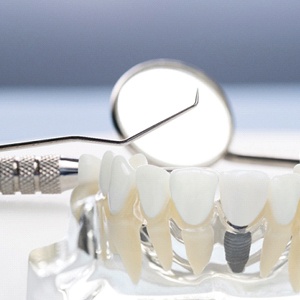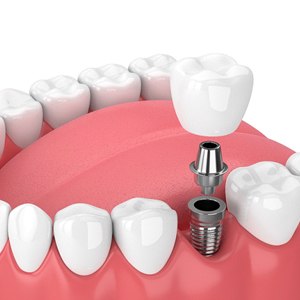 Serving McKinney, Frisco & Prosper
Serving McKinney, Frisco & Prosper
Cost of Dental Implants – McKinney, TX
Invest in Your Confidence and Oral Health
You may have heard many good things about dental implants, and perhaps you would love to talk to Dr. Lee, your dentist in McKinney, about getting them to replace your missing teeth. Still, you might hesitate due to concerns over cost. On this page, we explain some of the reasons why dental implants cost as much as they do, why they are worth every penny, and how you may be able to afford them.
Types of Dental Implants

Every patient is unique, which means that every dental implant procedure is also unique. The cost of your new teeth will depend on numerous factors, including the exact nature of your treatment. For example, if your bone is in good shape and you are only missing one tooth, you will only need a single dental implant and its accompanying crown. That will logically cost less than full-mouth replacement. The size and material of the final crown, bridge, or denture will also have a bearing on your overall costs. During your consultation, we will give you a candid estimate of the price of your tooth replacement treatment.
What Are the Stages of Dental Implant Treatment?

Replacing missing teeth with dental implants is a multi-step process. You may have to undergo:
- Preparatory treatment (such as a bone graft, extractions, or gum disease treatment)
- The implant placement surgery
- Abutment placement (abutments are small connectors that secure restorations to dental implants)
- Design and placement of the final restoration
You will not have to pay for all of the above-listed procedures upfront. Rather, you’ll pay for each one as it takes place, so you will have time to plan your budget between dental appointments. Also, because Dr. Lee performs the entire implant procedure in-house, you will not have to worry that an outside specialist will surprise you with a much higher-than-expected bill.
Are Dental Implants Worth the Investment?

Yes! Dental implants in McKinney provide more benefits than any other tooth replacement option. They are extremely sturdy, provide outstanding aesthetics, and are easy to care for. And since they rebuild teeth from the roots up, they also provide bone health benefits that you cannot get from traditional dental prosthetics. Plus, dental implants have the potential to last a lifetime. Their longevity may even make them a better long-term financial value than traditional dentures or bridges, which typically have to be replaced every 5 – 10 years or so.
Does My Insurance Cover Dental Implants?

Some dental insurance plans cover dental implants, whereas other do not. You will need to check the details of your specific policy to see how it applies. Even if your plan does not cover the implants themselves, it might cover other portions of your treatment, such as preparatory procedures or your final restoration. Also, keep in mind that low-interest financing through CareCredit is available for most patients; it can break up the cost of your treatment into reasonable monthly payments. Thanks to insurance and financing, you may be surprised to find out just how affordable dental implants can be!